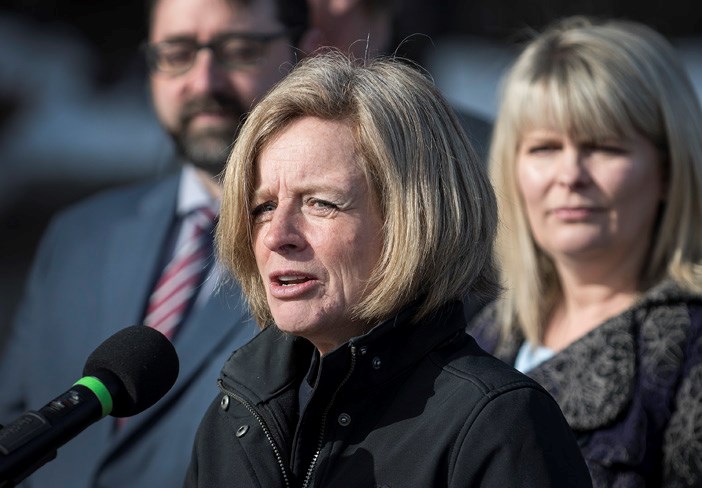The Alberta government’s decision to cut oil production in response to rock-bottom prices is earning accolades from both sides of the political aisle.
On Sunday night, Premier Rachel Notley announced that the government will cut the output of Alberta oil by 325,000 barrels per day starting in January, which equates to an 8.7-per-cent cut. The move comes after the price of provincial crude dropped to around $10 per barrel, which is a fraction of what other producers fetch on the market.
As of press time Tuesday, oil prices had rallied and Western Canadian Select was trading at $27.95. This time last Tuesday, it was priced at $11.56.
St. Albert MLA Marie Renaud said she is pleased with the decision to cut production as a short term solution to the oil price problem.
“It was part of a comprehensive plan and I appreciate that our premier is fighting for all of us, because we all own this resource,” Renaud said.
“She has demonstrated that she just doesn’t stop advocating and fighting for Alberta.”
The solution is the short-term arm of a plan that aims to help Alberta’s oil industry navigate the crisis levels of the low oil price.
Right now, Alberta produces around 3.7 million barrels of oil per day but not all of them are able to get to market. Around 190,000 barrels per day cannot be shipped, so they are added to a storage site, which has 35 million barrels of oil just waiting to get to market.
With no market access and an oversupply of oil, the price of the product drops.
Notley said Canada’s economy loses around $80 million daily because of the oil bottleneck.
“When markets aren’t working … we have a responsibility to act,” she said.
“This is a critically important matter for Canada’s economy, not just Alberta’s economy.”
Curtailing oil production is just one prong in Notley’s planned approach to manage the oil crisis. The production cut is a short-term solution, which along with the purchase of 7,000 railcars to ship 120,000 barrels per day, refining oil at home and pipeline advocacy, will make up the NDP oil crisis solution.
In the end, the provincial government hopes to get the Trans Mountain pipeline built as quickly as possible to ease the oil glut, but the project has been frequently delayed. After the project was initially green-lighted by the federal Liberals, they were sent back to the table after a flawed environmental review and a failure to consult with Indigenous peoples.
The federal government eventually purchased the pipeline for $4.5 billion in the hopes of speeding up the process.
Jeff Wedman, St. Albert candidate for the provincial United Conservative Party (UCP), said he is happy to see the government enacting a solution that was first proposed by the UCP.
“It’s gratifying to see them take a good idea from across the aisle and (implement) it,” Wedman said.
Wedman said the move is “better late than never” but that the NDP’s former policies and vocal opposition to the oil industry while they were in opposition are now coming home to roost.
The candidate noted that the government was “woefully naïve” to think a cosy relationship with Prime Minister Justin Trudeau would get the pipeline built.
Jared Wesley, a political science professor at the University of Alberta, said Notley’s decision to take the opposition party’s lead was a surprising political move.
“I had assumed she would have tried to carve a different path for herself other than what had been suggested (by) the opposition (party). On the other hand, it also speaks to the consensus among most policy experts that this was the right path forward,” Wesley said.
The benefit, Wesley said, is the move helps to neutralize the official opposition on the issue.
“Any time you can get your opposition to admit what you have done is right, even if they would have done it a little more quickly … I think that that’s an overall pretty good success story politically for them,” Wesley said.
The professor said the NDP likely wants to get this issue behind them quickly because they don’t want to be talking about pipelines and market access on the campaign trail next spring. Wesley said Albertans tend to trust conservatives more with issues of the economy and energy and the NDP will want to focus on its strengths, which are education and social programs.
Saskatchewan Premier Scott Moe has since come out and said they will not be following suit and cutting their oil production.




